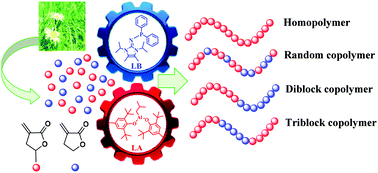Living polymerization of naturally renewable butyrolactone-based vinylidenes mediated by a frustrated Lewis pair†
Abstract
Renewable methylene butyrolactones, such as γ-methyl-α-methylene-γ-butyrolactone (MMBL) and α-methylene-γ-butyrolactone (MBL), have received particular attention due to their high reactivity and enhanced polymer performance. However, challenges still remain in the development of a living/controlled polymerization strategy for these renewable monomers. This contribution reports an effective frustrated Lewis pair consisting of a strong organophosphorus superbase and a sterically encumbered but modestly strong organoaluminum Lewis acid to rapidly polymerize (M)MBL into polymers with a predicted molecular weight (Mn up to 195 kg mol−1) and narrow molecular weight distribution (MWD as low as 1.04), thus affording high to near quantitative initiation efficiency. The livingness of MMBL polymerization catalyzed by the P(NIiPr)Ph2/(BHT)2AliBu FLP was confirmed by successful chain extension experiments and the formation of well-defined copolymers. Besides, this LPP strategy also enabled the synthesis of the diblock copolymers PMMA-b-PMMBL and PEEMA-b-PMMBL by using methacrylate as a comonomer. Furthermore, a kinetic study coupled with the characterization of the active zwitterionic species led to the bimolecular, activated monomer propagation mechanism proposed for (M)MBL polymerization catalyzed by such an FLP system.



 Please wait while we load your content...
Please wait while we load your content...